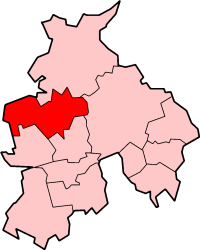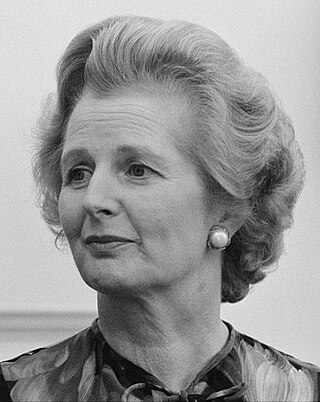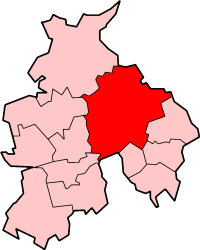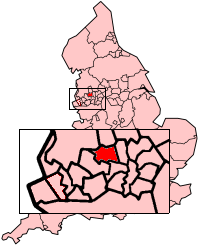
The fourth election to the Greater London Council (GLC) was held on 12 April 1973. Labour won a large majority of 58 seats to 32 for the Conservatives; the Liberals also won their first two seats on the council.

Wyre Borough Council elections are held every four years. Wyre Borough Council is the local authority for the non-metropolitan district of Wyre in Lancashire, England. Since the last boundary changes in 2015, 50 councillors have been elected from 24 wards.

Local elections were held in the United Kingdom on 6 May 1976. Elections were for one third of the seats on Metropolitan borough councils and for all seats on Non-Metropolitan district councils in England; and for all seats on the Welsh district councils.

Ribble Valley Borough Council elections are held every four years. Ribble Valley Borough Council is the local authority for the non-metropolitan district of Ribble Valley in Lancashire, England. Since the last boundary changes in 2019, 40 councillors have been elected from 26 wards.

The 2004 Bassetlaw District Council election took place on 10 June 2004 to elect members of Bassetlaw District Council in Nottinghamshire, England as part of the 2004 United Kingdom local elections. One third of the council was up for election.

Local elections were held in the United Kingdom in 1978. Elections took place in the London boroughs and metropolitan districts.
The 1978 Broxbourne Council election was held to elect council members of the Broxbourne Borough Council, the local government authority of the borough of Broxbourne, Hertfordshire, England.
Elections to Sheffield City Council were held on 10 May 1973.

Elections for the Scottish district councils were held on Tuesday 7 May 1974, for both the new regional and district councils, between the two United Kingdom general elections of February and October in that same year.

The first elections to Bolton Metropolitan Borough Council were held on Thursday, 10 May 1973, with the entirety of the 69 seat council - three seats for each of the 23 wards - up for vote. It was the first council election as the newly formed metropolitan borough under a new constitution. The Local Government Act 1972 stipulated that the elected members were to shadow and eventually take over from the County Borough of Bolton, the Municipal Borough of Farnworth, the Urban Districts of Blackrod, Horwich, Kearsley, Little Lever, and Westhoughton, and the southern part of Turton Urban District on 1 April 1974. The order in which the councillors were elected dictated their term serving, with third-place candidates serving two years and up for re-election in 1975, second-placed three years expiring in 1976 and 1st-placed five years until 1978.
Nottingham City Council elections are held every four years. Nottingham City Council is the local authority for the unitary authority of Nottingham in Nottinghamshire, England. Until 1 April 1998 it was a non-metropolitan district. Since the last boundary changes in 2019, 55 councillors are elected from 20 wards.
An election to Dinefwr Borough Council was held in May 1976. It was preceded by the 1973 election and followed by the 1979 election. On the same day there was UK local elections and elections to the other local authorities and community councils in Wales.
The 1976 Horsham District Council election took place on 6 May 1976 to elect members of Horsham District Council in England. It was held on the same day as other local elections. The Conservatives won a majority of 9 on the council, gaining from Independent. In a number of seats, candidates who stood as an Independent in 1973, when these seats were last contested, stood again as a Conservative Party candidate. Residents' association won their first seat to the council, winning a seat in Henfield. The Liberal Party lost both of their seats from the previous election three years ago.
The 1979 Horsham District Council election took place on 3 May 1979 to elect members of Horsham District Council in England. It was held on the same day as other local elections and the 1979 United Kingdom general election. The Conservatives retained control of the council with 33 seats, a majority of 12. The Independents had eight councillors elected, a decrease of three from last time. The Liberals gained a seat in Bramber & Upper Beeding and the Residents' association held on to their Henfield seat.

The 2022 Kirklees Metropolitan Borough Council election took place on 5 May 2022. One third of councillors—23 out of 69—on Kirklees Metropolitan Borough Council were elected. The election took place alongside other local elections across the United Kingdom.
The 1983 Reading Borough Council election was held on 5 May 1983, at the same time as other local elections across England and Wales. Following ward boundary changes, the number of seats on the council had been reduced from 49 to 45, arranged as 15 wards with three councillors each. All 45 seats on Reading Borough Council were up for election on the new boundaries.
The Slough Borough Council election was held on 1 May 1997, at the same time as other local elections across England and Northern Ireland, and on the same day as the general election. All of the 41 seats on Slough Borough Council were up for election, rather than the usual third of the seats. This was in preparation for the local government reorganisation in Berkshire which saw Berkshire County Council abolished and its functions transferred to the six district councils, including Slough, with effect from 1 April 1998. The elections to Berkshire County Council which would ordinarily have been held in 1997 were cancelled.
The 1976 Bracknell District Council election took place on 6 May 1976, to elect all 31 members in 16 wards for Bracknell District Council in England. The election was held on the same day as other local elections as part of the 1976 United Kingdom local elections. The Conservative Party ousted the one-term Labour Party council, winning all but 4 of the seats, with Labour group leader Bill Lindop losing his seat of Wildridings. The Liberal Party were able to hold onto their solitary seat in Crowthorne & Easthampstead. Despite leading the Conservative group into the election, Dorothy Benwell would be replaced by newly elected Tim Wood, who subsequently became leader of the council.
The 1979 Bracknell District Council election took place on 3 May 1979, to elect all 40 members in 19 wards for Bracknell Forest Borough Council in England. The election was held on the same day as both the 1979 United Kingdom general election and other local elections as part of the 1979 United Kingdom local elections. Due to a boundary review there had been a change in ward boundaries, along with an increase in size from 31 members elected in 1976. Despite losing government nationally, the Labour Party made up ground in Bracknell District from its landslide defeat in 1976. Although the Conservative Party ended up with the same number of seats as 1976, the increased size of the council saw its majority reduced. The Liberal Party lost its lone seat. This would be the last time a candidate outside the three main parties would win at an all-out election.








